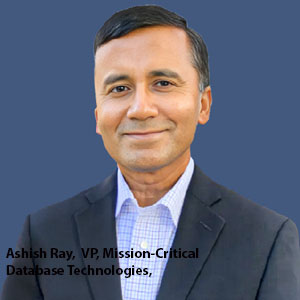 With the rapid increase in data volume and velocity, what are the biggest challenges organi -zations face in managing mission-critical data -bases?
With the rapid increase in data volume and velocity, what are the biggest challenges organi -zations face in managing mission-critical data -bases?The digitalization of India through initiatives such as UPI has resulted in an explosive growth of data volumes. Businesses and public institutions now rely heavily on three fundamental data aspects which include data access, data capacity optimization, and data protection. Organizations need to build data infrastructure systems that will support continuous large-scale transaction processing without experiencing any interruptions.
A smooth data accessibility solution stands as the top priority because digital users perform an immense number of transactions daily. Data platforms need scalability features that allow them to maintain high availability and performance while handling millions of simultaneous transactions. The 24/7 operation of UPI platforms leads to major economic losses whenever they experience even brief technical interruptions. The combination of Oracle Database 2.3 ai and Exadata provides systems that deliver uninterrupted high-speed transaction processing to help reduce such risks. These systems provide fault tolerance features that allow programs to operate without disruptions when minor operational failures occur. The system aims to execute transactions instantly so users can depend on the system across all locations while handling any number of simultaneous users.
The growing amount of data requires businesses to optimize their data capacity infrastructure. Digital ecosystems depend on extensive network connections that let customer data, partner records, product information as well as additional information move effortlessly between worldwide systems. Modern businesses choose innovative data compression approaches instead of building more storage systems because they need to manage their data capacity requirements. The Exadata technology from Oracle allows businesses to reduce data footprints by 10 times without compromising system performance. This method enables businesses to lower their expenses while maintaining data volume control throughout and expanding data storage requirements without requiring continual infrastructure updates.
Data protection stands as an essential priority because cybersecurity threats continue to grow in number. Ransomware attacks together with cyber attacks create major threats to corporate and governmental entities. The Zero Data Loss Recovery Appliance from Oracle provides an advanced protection method that encrypts entire stored information so attackers would not be able to modify or exploit the data even when they manage to access it. The technology enables businesses to manage backup restoration processes quickly after security breaches through its fully tested backup system. Multiple worldwide businesses implement Exadata together with Zero Data Loss Recovery Appliance to build resilient data management systems.
Businesses can achieve digital operational efficiency with security resilience by applying solutions to data accessibility, storage capabilities, and protection mechanisms. The digital economy of India depends on these advancements for maintaining secure data management that sustains its rapid digital expansion.
What are the key considerations for enterprises when choosing between on-premises, cloud, or hybrid database solutions?
Digital transformation operates as a fundamental driver of innovation for Indian businesses. The two essential elements for analysis consist of core systems along side digital programs that companies develop including AI-driven developments. Businesses dedicated to digital innovation should make a complete shift to the cloud. The fundamental business of most organizations does not involve IT operations therefore they should focus on their core functions. The cloud data centers and cloud regions created by Oracle provide IT management solutions through scalable systems that deliver secure high-performance environments.
Consider a firm that launches a brief marketing initiative for a newly released product. Two or three months of campaign duration with specific targeting of a test audience requires absolute agility. Real-time analytics and dashboards remain crucial for fashion brands conducting trend tests as well as pharmaceutical organizations conducting medicine effect analysis. Secure data uploads and program execution become possible through cloud services which also allow running analytics operations without the need to consider hardware or data center availability. Businesses across all industries now implement this practice which keeps them capable of quick adjustments.
Since core systems have vital mission critical functions, companies adopt a middle ground in their approach. The expertise of internal operations leads certain businesses to handle their core systems internally. Oracle provides multiple deployment options that let businesses use on-premises infrastructure while also allowing them to implement Exadata Cloud @ Customer hybrid solutions or perform step-by-step public cloud migration of their modules. Oracle provides consistent database technology that works identically between different platforms. The transition between different stages of infrastructure development becomes effortless for companies because the system requires no changes to their applications or system downtime.
Businesses remain apprehensive about their data processing capabilities when digital projects achieve their goals. The essential role in these situations belongs to cloud services. Businesses rely on cloud storage and computing because these systems enable the essential capability of scalability needed for both large campaign traffic variations and critical applications.
The competitive market situation enables Oracle to position its products with an integrated implementation of infrastructure within on-site systems and hybrid and public cloud atmospheres. Oracle provides complete database functionality and mission critical operations to customers in every deployment model, unlike other cloud providers. Business organizations need this continuous operation to avoid disruptions when modernizing their systems. The cloud-native databases provided by other cloud providers present challenges to businesses because they do not support on-premises deployment which creates complex migration obstacles. Companies can move through Oracle’s transition process smoothly while achieving continuous operational availability and maintaining high performance and security features along with scalable benefits.
What advice would you give to enterprises looking to modernize their database strategy while ensuring security, scalability, and cost effectiveness?
The main recommendation is to embrace innovation persistently. Data growth alongside innovative data management technologies such as Gen AI creates substantial business opportunities. Today marks an exceptional period for human progress because engineering together with technical innovations is developing at unprecedented speeds. Businesses need to maintain protection of essential systems while they create a dedicated team to discover and implement modern technologies. Organizations must maintain a competitive edge through strategic innovation planning which allows them to enhance their productivity.
Businesses need to show proper caution regarding risks that affect their fundamental systems. They need to protect core systems but without compromising innovation. Organizations need to establish an organized method for technological implementation for continuous progress.
The adoption of innovation needs to avoid causing disruptive changes. Excessive IT restructuring with new technology adoption along with strained human resources leads to a substantial reduction in investment returns. Oracle maintains its latest technology adoption methods without causing disruptions for our customers. The implementation of our innovative technology solutions follows a model that enables businesses to benefit from progressive solutions through system integration that avoids operational challenges.
Ashish Ray, VP, Mission-Critical Database Technologies, ORACLE
In an exclusive interview with CIOTechOutlook, Ashish Ray, VP of Mission-Critical Database Technologies at Oracle, shares his insights on the complexities that arise with mission-critical databases as organizations scale to handle higher volumes of incoming data while prioritizing data security without compromising performance. His product responsibilities include Exadata, Zero Data Loss Recovery Appliance, Oracle Database’s High Availability solutions, and all associated PaaS services.
Since core systems have vital mission critical functions, companies adopt a middle ground in their approach. The expertise of internal operations leads certain businesses to handle their core systems internally. Oracle provides multiple deployment options that let businesses use on-premises infrastructure while also allowing them to implement Exadata Cloud @ Customer hybrid solutions or perform step-by-step public cloud migration of their modules. Oracle provides consistent database technology that works identically between different platforms. The transition between different stages of infrastructure development becomes effortless for companies because the system requires no changes to their applications or system downtime.
Businesses remain apprehensive about their data processing capabilities when digital projects achieve their goals. The essential role in these situations belongs to cloud services. Businesses rely on cloud storage and computing because these systems enable the essential capability of scalability needed for both large campaign traffic variations and critical applications.
The competitive market situation enables Oracle to position its products with an integrated implementation of infrastructure within on-site systems and hybrid and public cloud atmospheres. Oracle provides complete database functionality and mission critical operations to customers in every deployment model, unlike other cloud providers. Business organizations need this continuous operation to avoid disruptions when modernizing their systems. The cloud-native databases provided by other cloud providers present challenges to businesses because they do not support on-premises deployment which creates complex migration obstacles. Companies can move through Oracle’s transition process smoothly while achieving continuous operational availability and maintaining high performance and security features along with scalable benefits.
What advice would you give to enterprises looking to modernize their database strategy while ensuring security, scalability, and cost effectiveness?
The main recommendation is to embrace innovation persistently. Data growth alongside innovative data management technologies such as Gen AI creates substantial business opportunities. Today marks an exceptional period for human progress because engineering together with technical innovations is developing at unprecedented speeds. Businesses need to maintain protection of essential systems while they create a dedicated team to discover and implement modern technologies. Organizations must maintain a competitive edge through strategic innovation planning which allows them to enhance their productivity.
Businesses need to show proper caution regarding risks that affect their fundamental systems. They need to protect core systems but without compromising innovation. Organizations need to establish an organized method for technological implementation for continuous progress.
The adoption of innovation needs to avoid causing disruptive changes. Excessive IT restructuring with new technology adoption along with strained human resources leads to a substantial reduction in investment returns. Oracle maintains its latest technology adoption methods without causing disruptions for our customers. The implementation of our innovative technology solutions follows a model that enables businesses to benefit from progressive solutions through system integration that avoids operational challenges.
Ashish Ray, VP, Mission-Critical Database Technologies, ORACLE
In an exclusive interview with CIOTechOutlook, Ashish Ray, VP of Mission-Critical Database Technologies at Oracle, shares his insights on the complexities that arise with mission-critical databases as organizations scale to handle higher volumes of incoming data while prioritizing data security without compromising performance. His product responsibilities include Exadata, Zero Data Loss Recovery Appliance, Oracle Database’s High Availability solutions, and all associated PaaS services.



